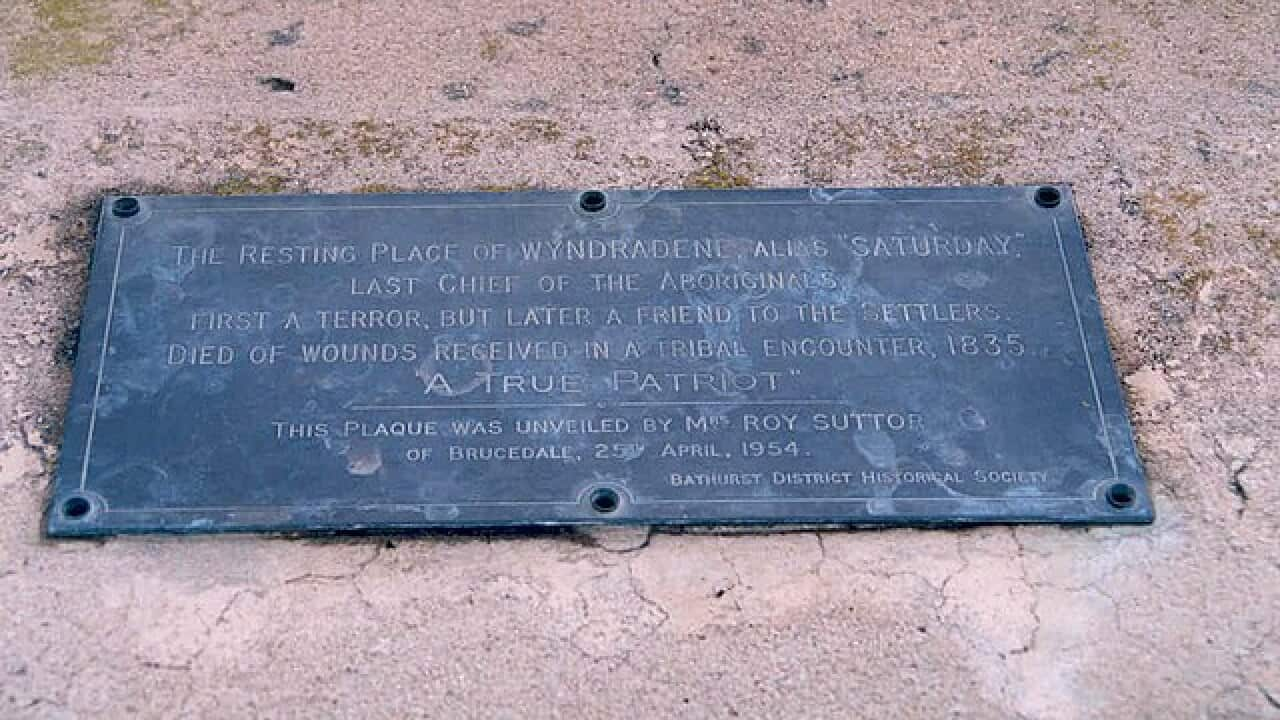Nestled in the grassy flats north of Bathurst is the grave of a Wiradyuri warrior.
Located at Brucedale, it is adorned with a plaque that was installed on ANZAC Day, 1954 by the Bathurst Historical Society and the Wiradyuri People.
It recognises “a true patriot”, the "last chief of Aboriginals" who was "first a terror, but later a friend to the settlers".
His name was Windradyne.

Windradyne was one of the many Wiradyuri People who fought against European expansion. Source: Wikimedia Commons
Resisting the colonial expansion
Believed to be born in 1800, Windradyne fought against violent colonial expansion across the central-west of New South Wales.
Between 1820 and 1824, settler numbers in Bathurst increased drastically. As the population rose, land was granted and cleared. Wiradyuri people were increasingly dispossessed, and animosity grew.
On August 4, 1824, in response to clashes between settlers and the Wiradyuri, Governor Brisbane of New South Wales declared martial law.
The law enabled any Aboriginal person west of Mount York on the Great Dividing Range to be shot on sight.
An article in the Sydney Gazette in 1824 called what followed the “exterminating war”.
The months that followed were violent and bloody, today known now as the Wiradyuri Wars, or the Bathurst Wars.
Dinawan Dyirrabang, otherwise known as Uncle Bill Allen, is a Wiradyuri Elder and a direct descendant of Windradyne through his mother, who told him stories of his ancestor's resistance.
"I do think about that period time, 'cause I don't be told some of the stories about what happened,” said Dinawan.
"We have our side of the story, whitefellas have their side of the story of what happened that day. Our story is a bit different.”

Frontier conflicts took place across the nation. Source: Supplied
An offering of peace
In December of 1824, Windradyne alongside other Wiradyuri People travelled to Parramatta, to attend the Governor’s Feast.
Flanked by his people, Windradyne addressed the Governor calling for an end to the killing and wearing a hat with “peace” written in English on his forehead.
Martial law was repealed.
“It is a pretty powerful moment. He was initiated as a warrior and he walked into Parramatta with a group of warriors with their heads held high," said Dinawan.
It was a hard thing for them to do, but the right thing to do so their people didn't suffer anymore."
In 1829, Windradyne died during what is recorded as a “tribal fight” along the Wambuul-Macquarie River.
He was laid to rest on the Brucedale property, home of the Suttor family, a friend who had provided a safe refuge for Wiradyuri People amongst the frontier fighting.

Windradyne's grave site at Brucedale property Source: Wikimedia Commons
Untold histories
For Dinawan, the area still holds trauma from the martial law years. Close to the centre of town is the site where members of Windrayne’s family were killed.
“I get a little bit anxious about it and a bit angry, but I try not to let it get to me,” he said.
“But because of those things, me and my family and all of us descendants afterwards, we have all lost out on [our] birthrights.
"Our rights to learn to speak our language properly, know where our cultural sites are and learn more about our culture.”
In 2024, it will be 200-years since the declaration of martial law in Bathurst. Despite the years, many of the stories of 1824 still haven’t been told. “This is an old colonial town, we still have people who don’t agree or don’t want to know,” said Dinawan.
“This is an old colonial town, we still have people who don’t agree or don’t want to know,” said Dinawan.

Dinawan Dyirribang, otherwise known as Uncle Bill Allen. Source: CSU
“But with more people moving here, things are opening up. People want to know about Wiradyuri here, because it hasn’t been talked about.
"There’s nothing really that acknowledges the Wiradyuri People.”
As that anniversary approaches, Dinawan feels the pressure of the need to heal.
"This is not about us blaming anybody, but we need the descendants of those early colonial families to stand with us and to sit and talk with us,” he said.
"The only thing we can do is heal, and we need to heal together, as one.
"You have to acknowledge history, it's not always been good, but you have to acknowledge the bad side too.”

Main street of Bathurst, New South Wales Source: Wikimedia Commons
Recognising frontier conflicts on ANZAC day
Yet almost 70-years on, Indigenous people who fought in frontier conflicts across the nation are not formally recognised on April 25.
"When you look at the wars that we fought, it was the Wiradyuri People taking on the British Empire. We took on the empire to fight for our Country,” said Dinawan.
"We should acknowledge them, alongside every other type of war.”
Serving in the Australian Army for 6-years after the Vietnam War, Dinawan said this wouldn’t diminish the recognition of other wars.
"There were over 250 different nations in this continent at the time of colonisation, each one fought for their own country and survival,” he said.
"Some of those areas, people have been completely annihilated. There remains no one from some of those Traditional countries.
“For us here in Bathurst, the Bathurst Wars were a war of extermination, as were so many of them. But yet, we survived and we should recognise that.”
Whilst it’s taking some time, Dinawan believes that one day, it’ll happen.
"Hopefully one day they will allow it to be part of the ANZAC services. We are slowly working on that here in Bathurst, and we’ll get there soon.”
Until then, Dinawan and the Wiradyuri people will continue to remember the "true patriot", Windradyne on April 25.












